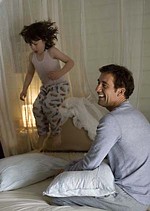Shine
1996, PG-13, 105 min. Directed by Scott Hicks. Starring Geoffrey Rush, Noah Taylor, Alex Rafalowicz, Armin Mueller-Stahl, Lynn Redgrave, John Gielgud, Googie Withers.
REVIEWED By Marjorie Baumgarten, Wed., Dec. 25, 1996
What is it about our mad artists that makes us love them so? Shine now adds the story of Australian pianist David Helfgott to our popular literature. Based on the life story of this child prodigy, Shine tells the story of this artist's life -- from his early years of study under the tutelage of his stern, tyrannical father (Mueller-Stahl), who is himself an emotionally scarred victim of the Holocaust; to David's decision to accept a scholarship to study abroad, which results in his disinheritance by his father, who permanently cuts David out of his life; to David's own mental breakdown in his 20s while performing his personal bogeyman piece, Rachmaninoff's “Piano Concerto No. 3” (affectionately referred to throughout the film as Rach 3); to David's decade-long institutionalization for treatment of his mental condition during which time he is forbidden to play the piano (the movie breezes past these years); to David's resurrection of himself as a popular performer and his discovery of the love of a good woman, an astrologer named Gillian (Redgrave). This sentimental favorite from last January's Sundance Film Festival begins with the artist's redemption, showing his re-entry into the world of the living following his long hibernation. It seals our romantic vision of the mad artist as an indomitable vessel whose functional resurrection is a testament to the human spirit. By choosing to tell in flashback the sad trajectory of this young man's life, the filmmakers have chosen to stress the human ability to triumph over the injustices of the past. It's as if to state that true artistry and a good soul will win out every time, and since we see little of David's years of isolation and therapy, we have no evidence to refute that romantic notion. Despite Shine's over-reliance on its feel-good story structure that leaves more questions unanswered than asked, the movie is wonderfully constructed. The viewer is swept along by the drama of David's life story, in its specifics of how a father's love and pride also contain the seeds of poison, and in its generalities about Oedipal knots and the sins of the fathers. No one aspect is ever examined terribly closely, making David Helfgott almost as much of a cipher at the end of the movie as at the beginning -- only now we have witnessed a resurrection and a just cause to celebrate. Contributing enormously to the success of the movie are its awesome performances. It is no accident that Geoffrey Rush, who plays David Helfgott in his latter years (he is played as a child by Alex Rafalowicz and as a young man by Noah Taylor) is showing up as best actor of the year on so many critical year-end lists. His performance as the babbling, stuttering bundle of childlike manhood is the film's most exuberant glory. As the anguished father, Mueller-Stahl delivers a performance that is truly devastating to watch. If, at times, Shine's luster reveals more elbow grease than internal radiance, the movie is still a moving tribute to the human capacity to overcome all odds. (Opens 12/25)
A note to readers: Bold and uncensored, The Austin Chronicle has been Austin’s independent news source for over 40 years, expressing the community’s political and environmental concerns and supporting its active cultural scene. Now more than ever, we need your support to continue supplying Austin with independent, free press. If real news is important to you, please consider making a donation of $5, $10 or whatever you can afford, to help keep our journalism on stands.
Marc Savlov, April 20, 2012
Marjorie Baumgarten, Oct. 2, 2009
March 15, 2025
March 14, 2025
Shine, Scott Hicks, Geoffrey Rush, Noah Taylor, Alex Rafalowicz, Armin Mueller-Stahl, Lynn Redgrave, John Gielgud, Googie Withers









